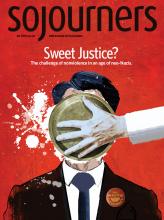THIS SPRING, more than 2,500 Southern Baptist women published a letter denouncing the misogyny and apparent toleration of domestic abuse exhibited by Paige Patterson, then head of Southwestern Baptist Theological Seminary and one of the Southern Baptist Convention’s most influential leaders.
These women are speaking truth to power at a critical time, affirming that “the Bible’s elevated view of womanhood,” as they put it, is completely incompatible with Patterson having counseled a woman who was being physically abused by her husband to keep quiet and pray for her husband, and with Patterson’s sexually objectifying comments about a 16-year-old girl. (In late May, Patterson was removed from his position as president of the seminary.)
The letter was a real risk for the signers in a religious world as conservative as the SBC, but it quickly opened up a needed conversation in the denomination and beyond.
We should be grateful for and inspired by the courageous witness of women in the church and broader society who are saying #MeToo and demanding accountability for predatory behavior and the pervasive sexism that creates an environment where sexual harassment and assault too often thrive. Too few men have demonstrated sufficient commitment to end domestic and sexual violence and dismantle the patriarchal system that undergirds them. Changes in both personal attitudes and structures are needed. Men in our churches, as in broader society, too seldom speak up on these issues.
A few years ago, Sojourners commissioned a poll of clergy across the country. We found that 65 percent of pastors speak once a year or less about sexual and domestic violence; 1 out of 10 pastors never address this topic. These distressing facts correlate with another of our findings: 74 percent of pastors underestimate how prevalent sexual and domestic violence is in their own congregations.
Read the Full Article

